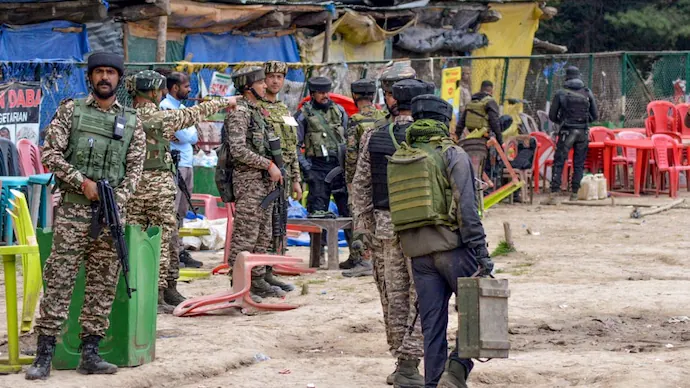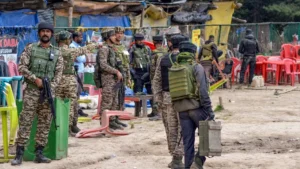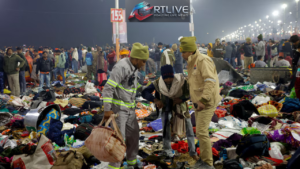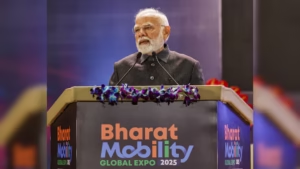Persona Non Grata Declared: India’s Firm Stance After Pahalgam Attack
India’s bold response to the devastating terrorist attack in Pahalgam, Jammu and Kashmir, is now defined as persona non grata and water treaty. In the aftermath of the tragedy, which claimed many lives, most of them tourists, India has taken decisive diplomatic and strategic steps that signal its firm resolve against terrorism. These include declaring Pakistani military diplomats persona non grata and suspending the long-standing Indus Water Treaty, sharply escalating tensions with its neighbour.
A Brutal Attack in Jammu and Kashmir Rocks
The tragic incident in Pahalgam, often called “Mini Switzerland” for its picturesque landscapes, saw terrorists emerge from dense pine forests and wreak havoc on unsuspecting tourists. One of the deadliest attacks in the Kashmir Valley in recent years, the attack targeted civilians who were enjoying a peaceful day in the plains, which can only be reached on foot or on horseback. The Lashkar-e-Taiba-affiliated Resistance Front has claimed responsibility and intensified the demand for justice.
India’s leadership immediately condemned the attack, with the prime minister vowing to catch and punish those responsible “beyond their imagination.” The nation observed a moment of silence to pay tribute to the victims, reflecting collective grief and determination to fight terrorism. The attack has reignited discussions on security in Jammu and Kashmir, a region that continues to face challenges despite significant policy changes in recent years.

Personnel Undesirables: A Diplomatic Rebuke
In a significant move, India declared Pakistan’s defence, naval and air advisers in New Delhi personnel undesirables, a Latin term meaning “unwanted person.” This rare and serious diplomatic action, formally taken under the 1961 Vienna Convention, underscores India’s outrage over the attack’s cross-border ties. The diplomats, along with support staff, were given a week to leave the country, while India announced the withdrawal of its advisers from Islamabad.
The persona non grata is a clear message to Pakistan, signalling India’s refusal to tolerate any support for terrorism. By targeting military diplomats, India has struck at the core of Pakistan’s diplomatic presence, leading to a deterioration in relations. The move, along with the closure of key border routes, has left Pakistan’s foreign office grappling with growing isolation on the global stage.
Suspension of Indus Waters Treaty
India’s suspension of the Indus Waters Treaty, a 1960 agreement governing shared river waters, is another unprecedented move. The suspension of the treaty is expected to have a profound economic impact on Pakistan, especially its agriculture-dependent economy. Indian officials have emphasised that the action reflects the will of the people, aimed at holding Pakistan accountable for its alleged role in supporting terrorism.
The decision to suspend the treaty, as well as the persona non grata declaration, has been described as a multi-pronged strategy to pressure Pakistan. By disrupting water access, India aims to send a strong signal that cross-border terrorism will face severe consequences. The move has sparked debate about the long-term impact on regional stability, with some praising it as a necessary response while others urging caution.
Unified call for justice
The Pahalgam attack has united political leaders and citizens across India in demanding justice. The government has vowed to track down the perpetrators and their sponsors, with the Cabinet Committee on Security ordering heightened vigilance. Statements from various leaders reflect a shared resolve to ensure that terrorism does not go unpunished, as well as calls for international cooperation to combat terror financing and cross-border conspiracies.
However, critics have raised concerns about security lapses, pointing to Pahalgam’s multi-layered security arrangements. Opposition voices have questioned the effectiveness of existing measures, urging a comprehensive review to prevent future tragedies. Despite these debates, the nation remains steadfast in its commitment to protecting its citizens and maintaining peace in the Kashmir Valley.
Global Solidarity and Regional Tensions
The international community has expressed solidarity with India, with several countries condemning the attack. The United States has updated its travel advisory, warning against travel to Jammu and Kashmir due to the risk of violence. Meanwhile, India’s actions, including the persona non grata and treaty suspension, have escalated tensions with Pakistan, which now faces diplomatic and economic challenges.
While India deals with this crisis, its response underscores its zero-tolerance policy towards terrorism. The persona non grata and Indus Water Treaty suspension are not merely retaliatory measures but reaffirm India’s determination to defend its sovereignty and ensure justice for the victims of the Pahalgam attack.
Also Read:- Veera Dheera Sooran Part 2: A Gripping Tamil Action Drama











Post Comment